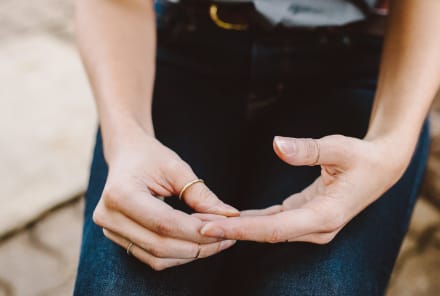Advertisement
How We Become Enchanted With New Habits, According to A Neuroscientist


While January 1 gets all the buzz for fresh starts, there's something about the back-to-school energy of September that has us setting new goals for the year with serious enthusiasm.
Perhaps it is the disruption to our "normal" lives thanks to COVID-19, or maybe it's just the newly crisp air, but we're definitely thinking it's time to add some fresh and healthy habits to our daily routines. But how can we be sure we stick to something so it goes from a pipe dream to a routine?
According to neuroscientist and psychiatrist Jud Brewer, M.D., Ph.D., the secret may lie in embracing that feeling of enchantment that comes from trying something new. When Brewer appeared on the mindbodygreen podcast, he and mbg founder and co-CEO Jason Wachob talked all things training our brain to accomplish the things we want.
Why new habits are enchanting.
Creating a habit can be something small, like remembering to take supplements, or something larger, like establishing a whole new routine. But there's one thing Brewer says remains the same: We often love the idea of implementing these changes.
But when it comes to making them stick—making them truly "enchanting"—there's a key component. "How do we start new habits?" he says. "We become enchanted with the new ones because they just feel better."
What that means for us is that becoming mindful of the why, the reason we're adopting a habit is important: Most well-being habits are anchored in making ourselves feel better, be it physically or mentally. "Habits are set up to help us chunk information so we don't need to retrieve all the details," says Brewer. "We can just remember the reward value of something." But the value may not be something we instantly experience—it may be a longer-term benefit like increased longevity, decreased anxiety, or better sleep.
Because of this, reminding ourselves of how good this new habit will make us feel—in the long term—can be a powerful aid in bringing about that enchantment, which in turn will help cement our new habit.
How to use awareness to help make habits stick.
One of the key principles of mindfulness, harnessing our own awareness can be a powerful tool for training our brain. "We can start with something that we all have, which is awareness," Brewer explains. With increased awareness, he says we can "see what mental and physical behaviors are actually bringing more joy."
Practicing awareness is, conveniently, pretty simple: Start with noticing where your attention is at that moment, and then pull it back to the current moment or the current focus. Breathwork can be a powerful tool for increasing awareness, and learning to harness it is also an important part of many forms of meditation.
What we want to bring our awareness to, when using it to adopt new habits, is something Brewer calls the the "bigger better offer" (or the BBO). For example, hitting snooze may seem like the best option right now, but the true "BBO" is getting up with our alarm so we can start our day right—not rushing around, spiking our stress before the day has even begun. No matter what new thing you're hoping to start, focusing your awareness on the ways that adopting this new habit will improve your life can help bring about that aforementioned enchantment with the practice—which in turn will make sticking to it a lot simpler.
Finding a way to remind yourself of the benefits of a new habit may be as simple as finding a function mantra for this encouraging this shift—plus, evidence suggests regular mantra use may actually reprogram your brain, which can help make adopting that habit an even smoother transition. Not only does Brewer have advice for getting our new healthy habits to stick, but you can also take his advice on breaking bad habits—starting with curiosity.
Watch Next
Enjoy some of our favorite clips from classes
Enjoy some of our favorite clips from classes
What Is Meditation?
Mindfulness/Spirituality | Light Watkins
Box Breathing
Mindfulness/Spirituality | Gwen Dittmar
What Breathwork Can Address
Mindfulness/Spirituality | Gwen Dittmar
The 8 Limbs of Yoga - What is Asana?
Yoga | Caley Alyssa
Two Standing Postures to Open Up Tight Hips
Yoga | Caley Alyssa
How Plants Can Optimize Athletic Performance
Nutrition | Rich Roll
What to Eat Before a Workout
Nutrition | Rich Roll
How Ayurveda Helps Us Navigate Modern Life
Nutrition | Sahara Rose
Messages About Love & Relationships
Love & Relationships | Esther Perel
Love Languages
Love & Relationships | Esther Perel

















